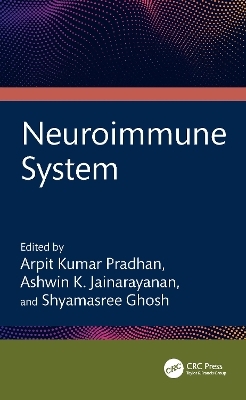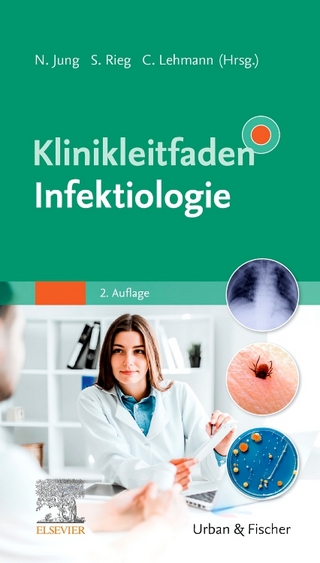
Neuroimmune System
CRC Press (Verlag)
978-1-032-28140-7 (ISBN)
- Lieferbar (Termin unbekannt)
- Versandkostenfrei innerhalb Deutschlands
- Auch auf Rechnung
- Verfügbarkeit in der Filiale vor Ort prüfen
- Artikel merken
Key Features:
In-depth analysis of immunological biomarkers and therapeutic targets for neurodegenerative disorders.
Exploration of the role of glial cells in neuroimmune interactions and their dual nature in disease pathology.
Examination of short- and long-range interactions between the central nervous system (CNS) and immune system, including hormonal axis and cytokine milieu.
Discussion on the impact of microbiota on neural networks and immune responses, highlighting the gut-brain axis and potential therapeutic avenues.
Utilization of Drosophila model systems to study neurodegeneration, providing insights into disease mechanisms and potential treatment strategies.
Coverage of various neurodegenerative disorders, including Alzheimer’s, Parkinson’s, polyglutamine-related diseases, and tauopathy, with a focus on understanding disease progression and identifying therapeutic targets.
The book stands out for its interdisciplinary approach, bridging the fields of neuroscience, immunology, and microbiology to provide a holistic understanding of neurodegenerative diseases. It offers valuable insights into the complex interplay between the nervous and immune systems, shedding light on novel therapeutic avenues for treating these debilitating conditions. Suitable for researchers, clinicians, and students in the fields of neurology, immunology, and microbiology, this book serves as an essential resource for understanding the pathogenesis and treatment of neurodegenerative disorders.
Dr. Arpit Kumar Pradhan Department of Psychology, University of Michigan, Ann Arbor, MI 48109, USA Dr. Arpit Kumar Pradhan is currently a postdoctoral research fellow at the University of Michigan working with Professor Ada Eban-Rothschild to study the role of sleep in memory consolidation. He has expertise in the application of behavioral neuroscience, electrophysiology, and advanced imaging techniques to study neurodegeneration and develop potential therapeutic interventions. He completed his doctoral degree (PhD) from the Graduate School of Systemic Neurosciences at the Ludwig Maximilian University of Munich under the guidance of Professor Gerhard Rammes. During his doctoral program, Dr. Pradhan studied the impact of translocator protein (TSPO) activation on amyloid beta-induced synaptotoxic effects and showed that TSPO ligands such as XBD173 via delta subunit-containing GABAA receptors ameliorates the pathophysiology in Alzheimer’s disease. He has completed his master's from NISER Bhubaneswar, India, and has spent substantial research time working in the field of neurodegeneration at NUS Singapore, IIT Bombay, JNCASR Bangalore, and TIFR Mumbai. His research interests include studying sleep and memory consolidation, neuro-glia interactions and their potential effect on behavior, and neurodegeneration. Dr. Ashwin Jainarayanan Interdisciplinary Bioscience Doctoral Training Program and Exeter College, University of Oxford, Oxford, UK Kennedy Institute of Rheumatology, Nuffield Department of Orthopedics, Rheumatology and Musculoskeletal Sciences, The University of Oxford, Oxford, UK Dr. Ashwin Jainarayanan is an interdisciplinary researcher with a passion for translational medicine. They specialize in computational biology, applying next-generation sequencing technologies to dissect immunosuppressive mechanisms in the cancer microenvironment. Dr. Jainarayanan completed their DPhil/PhD in Interdisciplinary Bioscience (BBSRC DTP) under the co-supervision of Professor Michael Dustin and Professor Matthew Wood. Their doctoral research focused on characterizing extracellular particles released into the immunological synapse, a nano-scale gap between T cells and antigen-presenting cells. Prior to their doctoral studies, Dr. Jainarayanan graduated with a BS-MS dual degree from the Indian Institute of Science Education and Research (IISER), Mohali, India. Dr. Jainarayanan's research interests center around the intersection of immunology, synthetic biology, and neuroscience, with a particular emphasis on addressing critical challenges in cellular diagnostics and targeted molecular therapies. Dr. Shyamasree Ghosh Scientific Officer (F) at NISER Bhubaneswar, India Dr. Shyamasree Ghosh has several years in service in the post of Scientific Officer in NISER Bhubaneswar, India. She has graduated from the prestigious Presidency College, Kolkata, with Masters in Biotechnology from Calcutta University, ranking second in the University. She did her PhD in Cancer Biology from the Indian Institute of Chemical Biology (IICB), Kolkata, with Post from the Indian Association of the Cultivation of Sciences (IACS, Kolkata). Dr. Ghosh has extensively worked with the immune system and interdisciplinary domains of stem cells, carbohydrate biology and computational biology, she has authoured several books, and published in interdisciplinary domains.
1 The Biology of Neuroimmune Communication
2 Neuroimmune System scenario in Neurodegenerative Disorders
3 Do You Have the Nerves to Fight Infection?
4 Microbiota in Neuroimmune Regulations: Insights into Gut Neuropeptides And Gut Hormones
5 Neuroimmune biology in Cancer
6 Drosophila models of Neurodegenerative Disorders
| Erscheinungsdatum | 04.10.2024 |
|---|---|
| Zusatzinfo | 6 Line drawings, black and white; 6 Illustrations, black and white |
| Verlagsort | London |
| Sprache | englisch |
| Maße | 156 x 234 mm |
| Gewicht | 430 g |
| Themenwelt | Medizin / Pharmazie ► Medizinische Fachgebiete ► Neurologie |
| Studium ► Querschnittsbereiche ► Infektiologie / Immunologie | |
| Naturwissenschaften ► Biologie ► Humanbiologie | |
| Naturwissenschaften ► Biologie ► Zoologie | |
| Recht / Steuern ► Strafrecht ► Kriminologie | |
| Technik ► Umwelttechnik / Biotechnologie | |
| ISBN-10 | 1-032-28140-5 / 1032281405 |
| ISBN-13 | 978-1-032-28140-7 / 9781032281407 |
| Zustand | Neuware |
| Informationen gemäß Produktsicherheitsverordnung (GPSR) | |
| Haben Sie eine Frage zum Produkt? |
aus dem Bereich


